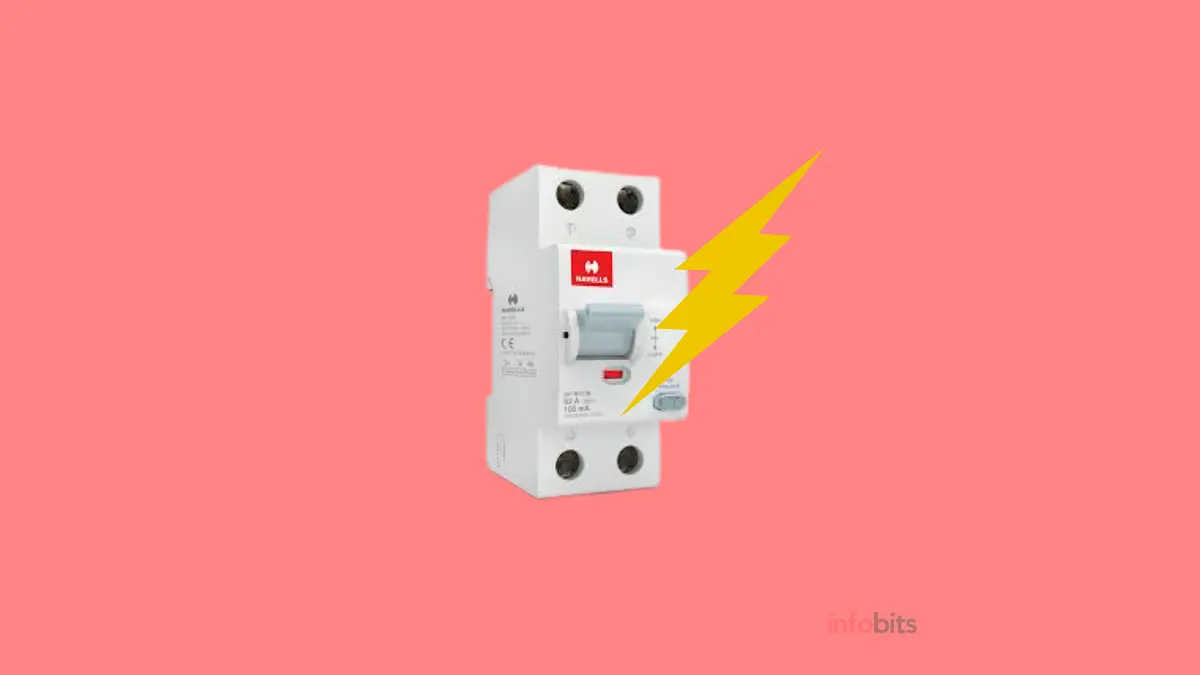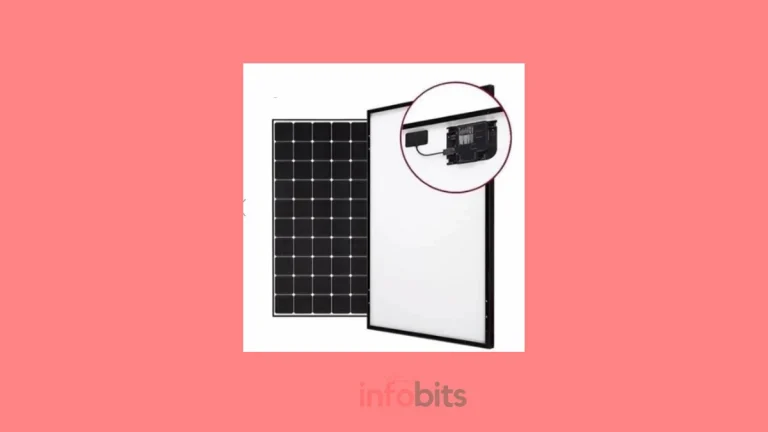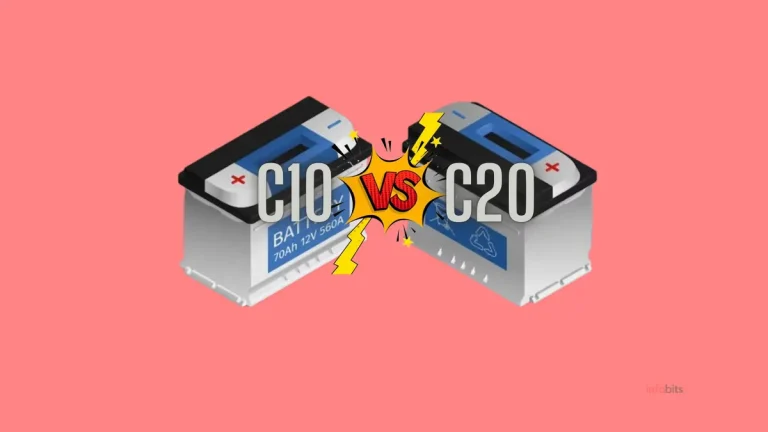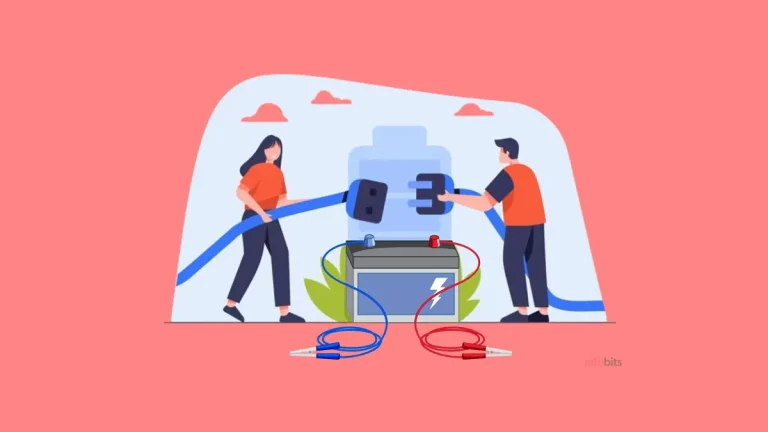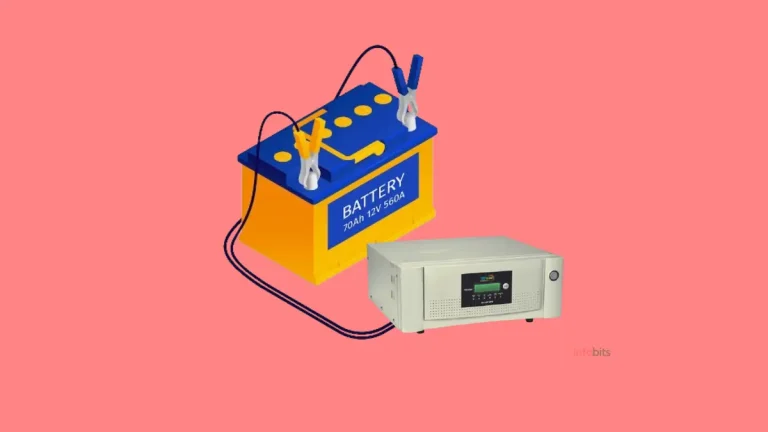Why Does RCCB Trip When Lightning Strikes?
To understand why the RCCB rips when the lighting occurs, we have to go through the normal workings of an RCCB.
A residual current circuit breaker is generally called an RCCB, and it works by sensing the residual current or leakage current in the circuit.
It is a device designed to protect devices and people from electrical earth faults. An RCCB-connected electrical circuit continuously monitors the incoming and outgoing current through it.
This means that the RCCB always checks that the current flowing in the phase line (s) and neutral line are the same.
If there is any variation or unbalance in the current value, the RCCB will work and the circuit will be isolated.
The variation in the current between the two lines means that there is some leakage current anywhere in the circuit.
In a healthy circuit, the phase current flows through the load and returns to the RCCB through the neutral line.
If the phase line comes in contact with any earthed path, including humans, there will be current flow to the earth.
RCCB senses this current flow and disconnects the circuit to protect the device or life from electrical shock or any other hazards.
Here we have seen that whenever there is an unbalanced current between the phase line and the neutral line of the RCCB, it will function as a safety device.
Then let us understand why the RCCB trips during lightning strikes.
When lightning occurs heavy voltage is developed in overhead electrical lines. Most of the time, it produces transient or surge voltages and currents in the transmission and distribution lines.
It may affect the phase and neutral lines simultaneously. But it should be noted that on the distribution side, the neutral lines are always earthed to keep their zero ground potential.
So whenever electrical lightning occurs on a neutral line, it will be directly grounded to the earth. But when it occurs on the phase line, it tries to flow to the earth through the nearest available earth path.
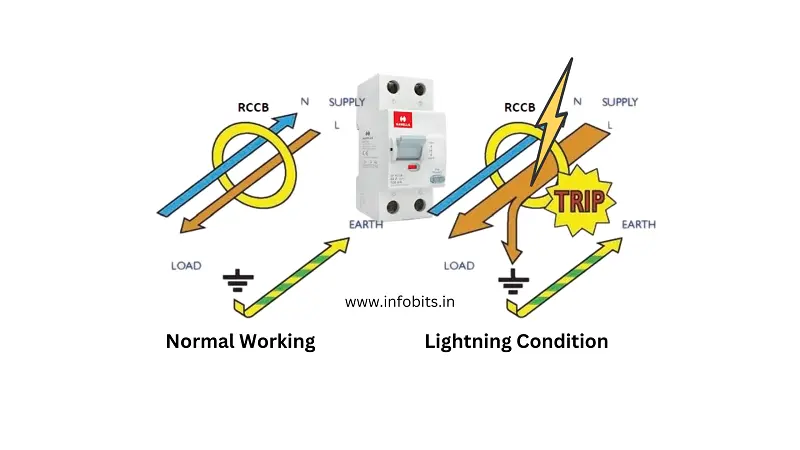
Suppose lightning occurs on the phase line in your area. It may flow to Earth through your earthing circuit.
Here the lightning current (surge current or transient) in the phase line is not returning to the neutral line as it is bypassed to earth. So RCCB senses an unbalancing of current flow and it starts to operate.
Thus, the devices connected to the electrical circuit will be isolated and protected from the high lightning surge currents.
But you should note that even though an RCCB trips during lightning, it is not a suitable device to handle huge lightning transients or surge currents.
For this, we have to use a dedicated device called a surge protection device (SPD) or surge protector.
We always recommend installing a good surge protector (view on Amazon) in your electrical circuit, especially when powering up valuable electronic devices such as PCs, laptops, music systems, or similar items.
So we can conclude that when lightning occurs, some transient current or voltage develops in the electrical circuit, through which leakage or residual current flows to the earthing circuit.
RCCB identifies this residual current and functions to disconnect the circuit.
I hope that now you have an idea why the RCCB trips when lightning strikes.
If you feel this information is useful, don’t forget to share this article with your family and friends.
Frequently Asked Questions
Yes. Most lightning strikes will trigger the Residual Current Circuit Breaker (RCCB).
When there is an unbalance between the incoming (flowing to the load) and outgoing (flowing from the load) currents, the RCCB trips.
During a thunderstorm, a significant amount of voltage builds up in the distribution line as a result of lightning, causing an imbalance in the current flowing through the RCCB. The RCCB will trip as a result of this.
You may switch off your main breaker to prevent any electrical current from entering your home during the thunderstorm. This is an excellent approach to safeguard your home’s wiring from surges and dramatically minimizes the danger of fire caused by aged wire being overloaded with high transient voltage during lightning.
When there is an earth leakage current, both RCCB and ELCB are put in place to isolate the circuit. Their operating principles, however, differ. When the incoming and outgoing currents are out of balance, the RCCB operates. However, the ELCB detects and activates when electricity flows across the ground line. There is no need to connect the RCCB to the main earthing system, however, the ELCB requires an earthing connection.
Also Subscribe to our free newsletter so that you will get regular updates, informational ebooks, and the latest deals& offers directly in your Email.
Disclosure: If you follow our links to a retailer’s website and make a purchase, we will get an affiliate commission on some, but not all, of the items or services we promote.

